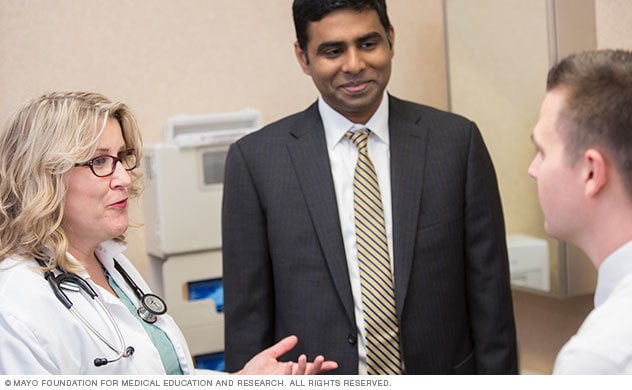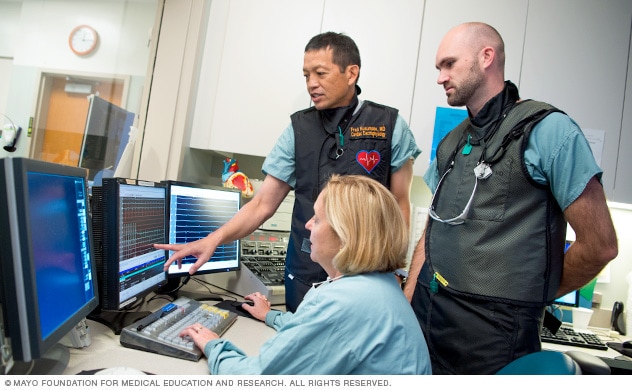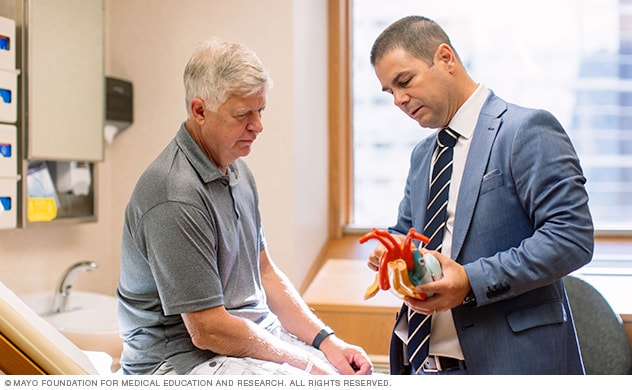Mayo Clinic's approach
At Mayo Clinic, experts in heart rhythm disorders provide compassionate, whole-person care to people considering cardiac ablation.
 Working as a team to provide expert care
Working as a team to provide expert care
At Mayo Clinic, healthcare professionals work together to understand your condition and provide personalized treatment options.
Experience you can trust
Cardiac ablation is performed by heart specialists (cardiologists) with special training in heart rhythm disorders (electrophysiologists). Mayo Clinic has one of the largest cardiac ablation practices, with skilled electrophysiologists working in the Electrophysiology Laboratory.
Studies show there is a reduced risk of complications from cardiac ablation when the treatment is done by an experienced electrophysiologist in a hospital that does many of these procedures.
Why choose Mayo Clinic for cardiovascular care
Collaborative approach to care
At Mayo Clinic, electrophysiologists work closely with other experts, including cardiologists and cardiovascular surgeons, in the Heart Rhythm Clinic to understand your heart arrhythmia. They recommend the treatment options that will work best for you. Doctors trained in treating children with heart conditions, called pediatric cardiologists, work with a team of experts to care for children with arrhythmias at Mayo Clinic's campus in Minnesota. This team approach helps ensure you or your child receive exactly the care you need.
 Using advanced technology to provide care
Using advanced technology to provide care
Mayo Clinic experts have access to the most advanced systems for diagnosing and treating heart rhythm problems.
The most advanced treatment systems
Mayo Clinic doctors perform cardiac ablation procedures using the latest and most advanced technology.
The experienced staff uses advanced cardiac mapping systems, including multielectrode mapping and 3D heart mapping, during an electrophysiology (EP) study to decide where to accurately apply cardiac ablation treatment. This type of mapping combined with intracardiac echocardiography reduces exposure to radiation.
Your doctor chooses the type of cardiac ablation that's best for you and your specific condition. Ablation uses heat energy, called radiofrequency energy, or cold energy, called cryoablation. It is applied using the latest innovations in treatment catheters and technology, such as balloon and robotic catheters.
Expertise in all arrhythmias, including rare and difficult ones
Mayo Clinic doctors have used cardiac ablation to treat a variety of arrhythmias, including those that are very rare or difficult to treat.
Mayo Clinic experts specialize in:
- Treating complex atrial and ventricular arrhythmias.
- Repeat cardiac ablation for those who've had it before without success.
- Cardiac ablation for adults and children with congenital heart disease.
 Providing compassionate care
Providing compassionate care
Your Mayo Clinic care team has extensive experience diagnosing and treating all types of arrhythmias.
Expertise and rankings
Mayo Clinic electrophysiologists are recognized as experts in their field who have made important contributions to the understanding of arrhythmia diagnosis and treatment. Each year, more than 2,000 people have cardiac ablation at Mayo Clinic.
Nationally recognized expertise
Mayo Clinic campuses are nationally recognized for expertise in cardiology and cardiovascular surgery.
Mayo Clinic in Rochester, Minnesota, Mayo Clinic in Phoenix/Scottsdale, Arizona, and Mayo Clinic in Jacksonville, Florida, are ranked among the Best Hospitals for heart and heart surgery by U.S. News & World Report. Mayo Clinic Children's in Rochester is ranked the No. 1 hospital in Minnesota and the five-state region of Iowa, Minnesota, North Dakota, South Dakota and Wisconsin, according to U.S. News & World Report's 2025-2026 "Best Children's Hospitals" rankings.
With Mayo Clinic's emphasis on collaborative care, specialists at each of the campuses — Minnesota, Arizona and Florida — work closely with colleagues at the other campuses and the Mayo Clinic Health System.
Learn more about Mayo Clinic's expertise and rankings in cardiovascular medicine.
Locations, travel and lodging
Mayo Clinic has major campuses in Phoenix and Scottsdale, Arizona; Jacksonville, Florida; and Rochester, Minnesota. The Mayo Clinic Health System has dozens of locations in several states.
For more information on visiting Mayo Clinic, choose your location below:
Costs and insurance
Mayo Clinic works with hundreds of insurance companies and is an in-network provider for millions of people.
In most cases, Mayo Clinic doesn't require a physician referral. Some insurers require referrals or may have additional requirements for certain medical care. All appointments are prioritized on the basis of medical need.
Learn more about appointments at Mayo Clinic.
Please contact your insurance company to verify medical coverage and to obtain any needed authorization prior to your visit. Often, your insurer's customer service number is printed on the back of your insurance card.
Clinical trials
Explore Mayo Clinic studies of tests and procedures to help prevent, detect, treat or manage conditions.
Feb. 02, 2024